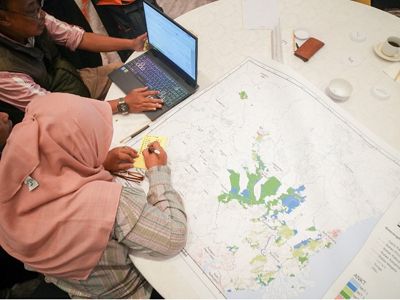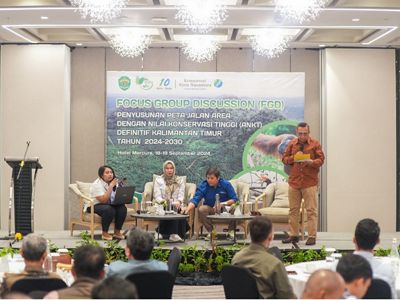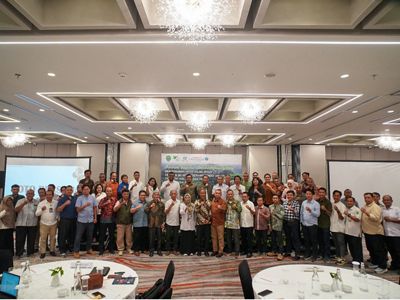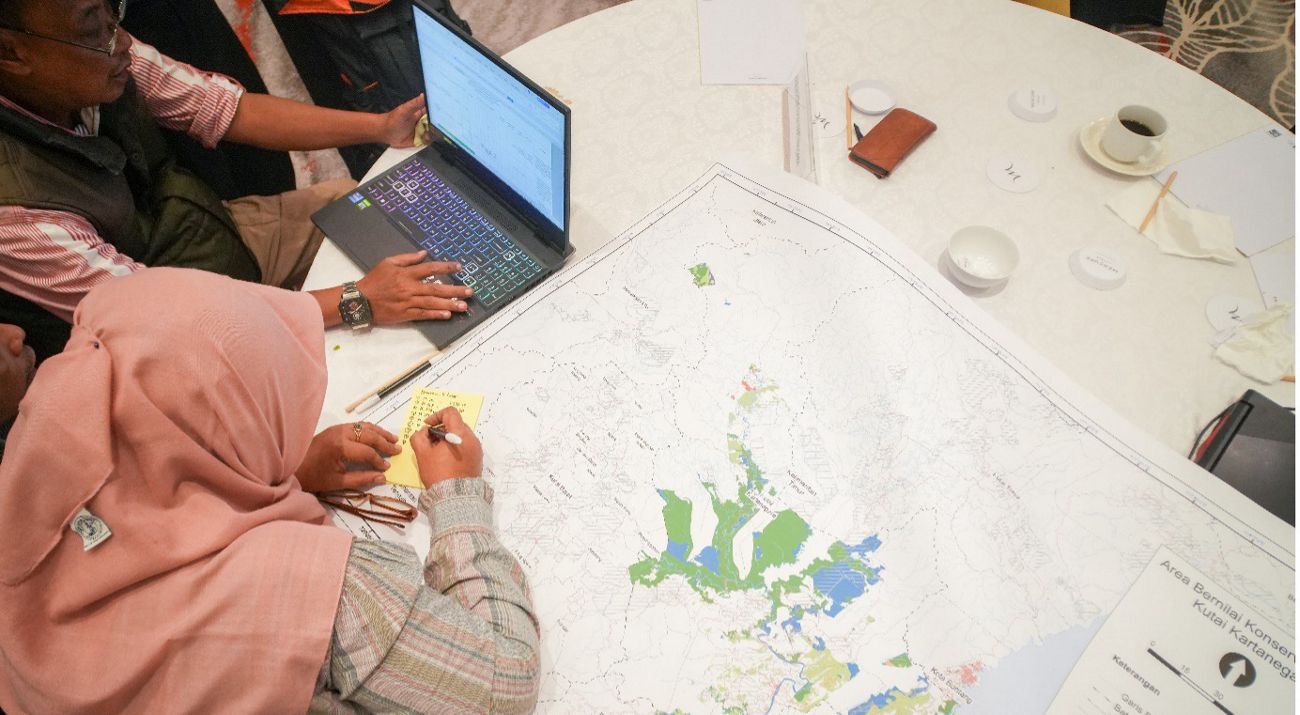Media Contacts
-
Retno Sari
Content and Publication Specialist YKAN
Yayasan Konservasi Alam Nusantara
Email: retno.dianingsari@ykan.or.id
Palm oil plantations are a large-scale agricultural industry crucial to the East Kalimantan government. The province is the fifth largest palm oil producer in Indonesia, with a production of 4.22 million tons (8.98%) in 2023. The allocation of Palm Oil Revenue Sharing Funds for East Kalimantan in 2024 is IDR 182.65 billion. “Palm oil plantations are economically important, but East Kalimantan is consistently moving towards sustainable plantations by protecting High Conservation Value Areas (HCVA),” said Acting Secretary of the East Kalimantan Plantation Agency, Andi Sidik, representing Head of the East Kalimantan Plantation Agency E. A. Rafiddin Rizal, at the opening of a focused discussion on the 2024-2030 Roadmap Towards the Establishment of Definitive HCVA Areas in East Kalimantan in Samarinda, September 18, 2024.
The event featured representatives from district and provincial government agencies, plantation associations, development partners, independent smallholders, HCVA management community groups, and sustainable plantation communication forums. In the context of plantations, HCVA refers to land or areas within plantation zones that hold significant biological, ecological, social, and cultural value at the site, regional, national, or global levels.

Andi stated that establishing HCVA across East Kalimantan is a long journey with no end in sight. Currently, East Kalimantan has a Governor’s Decree on the Indicative HCVA Map for the 2020 Plantation Zone, covering 456,827 hectares. Of this, the total area already designated by the Regent’s Decree is 270,520.61 ha. “A significant progress of 60 percent of the total area designated by the provincial government through the Governor’s Decree,” said Andi. He hopes the remaining 40 percent will soon be achieved. The existence of a definitive HCVA roadmap is expected to serve as a guide.
Through Governor Regulation 12/2021 on HCVA Criteria, the provincial government mandates all companies to identify, manage, and monitor HCVA within their concessions. The regulation also tasks regents with similar responsibilities for HCVA outside company concessions. These efforts must be reported to the government regularly. However, by 2024, not all companies have reported their efforts to conserve HCVA, nor have those outside company concessions. Meanwhile, land clearing for expanding palm oil plantations continues inside and outside concessions. “This is what we aim to improve through a joint agreement in the roadmap for East Kalimantan,” said Yohannes Ryan, Sustainable Palm Oil Development Manager at Yayasan Konservasi Alam Nusantara (YKAN), during the same event.
Additionally, the designation and protection of HCVA will help East Kalimantan’s palm oil products compete in national and global markets, as they meet the sustainability standards required by certifications such as ISPO and RSPO. Ensuring the presence of HCVA will greatly assist all parties, including the government, companies, communities, and development partners, in determining which areas can be developed for palm oil plantations and which should not so that the products can enter the market.

YKAN, through its Sustainable Palm Oil strategy, fully supports the implementation of HCVA in East Kalimantan in collaboration with the East Kalimantan Sustainable Plantation Communication Forum. Indicative HCVA maps serve as references in the licensing process, plantation business operations, strategic environmental studies, and regional spatial planning. These indicative maps need to be reviewed every five years at the provincial level and every two years at the district/municipal level. This review is essential to update field conditions, land use changes, land cover, licensing information, and stakeholder input.
On the ground, there are still many challenges in establishing indicative HCVA maps, especially outside concessions. The cause is the roles and responsibilities between agencies need to be clarified. Yohannes explained that to ensure that high conservation value areas are preserved and managed sustainably, it is crucial to have strategies, plans, and actions agreed upon by all stakeholders in a straightforward document that can serve as a reference. “Especially to upgrade the indicative status to definitive areas inside and outside company concessions,” he said.

This roadmap is an effort to collaborate to save HCVA. Yus Alwi Rahman, Chairman of the East Kalimantan Sustainable Plantation Forum, added that the East Kalimantan government continues to build sustainable plantations. “We have been pioneering HCVA since 2015 when the Plantation Agency started initiating the drafting of the Regional Regulation on Sustainable Plantations,” he said during the same event. Innovations and regulatory developments continue. “But our commitment in East Kalimantan remains the same, which is to protect and manage HCVA so that it becomes one of the pioneers in Indonesia,” he said.
Yayasan Konservasi Alam Nusantara (YKAN) is a scientific-based non-profit organization that has been present in Indonesia since 2014. With the mission of protecting lands and waters as life support systems, we provide innovative solutions to realize the harmony of nature and humans through effective natural resource management, prioritizing a non-confrontational approach, and building a network of partnerships with all stakeholders for a sustainable Indonesia. For more information, visit ykan.or.id.


